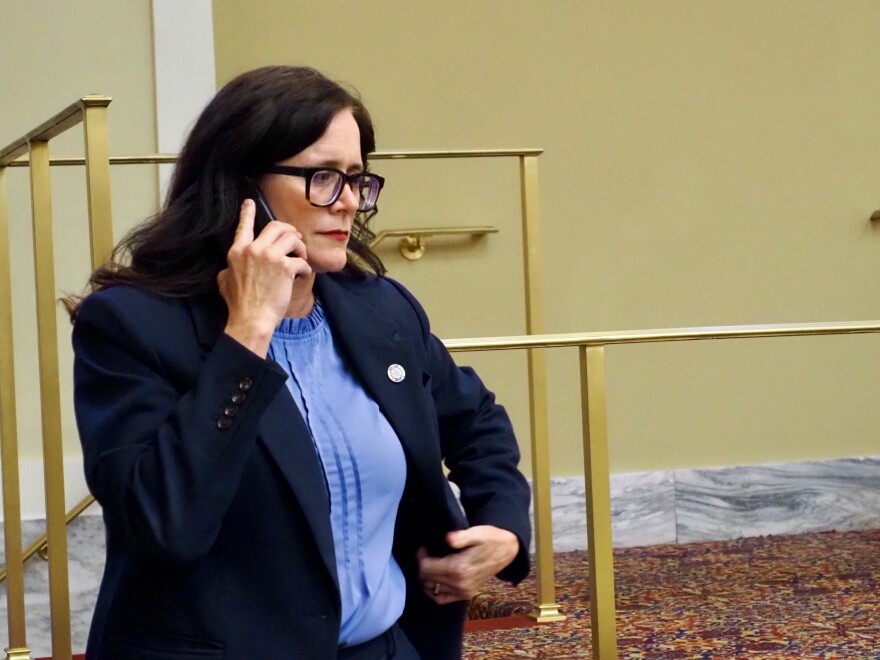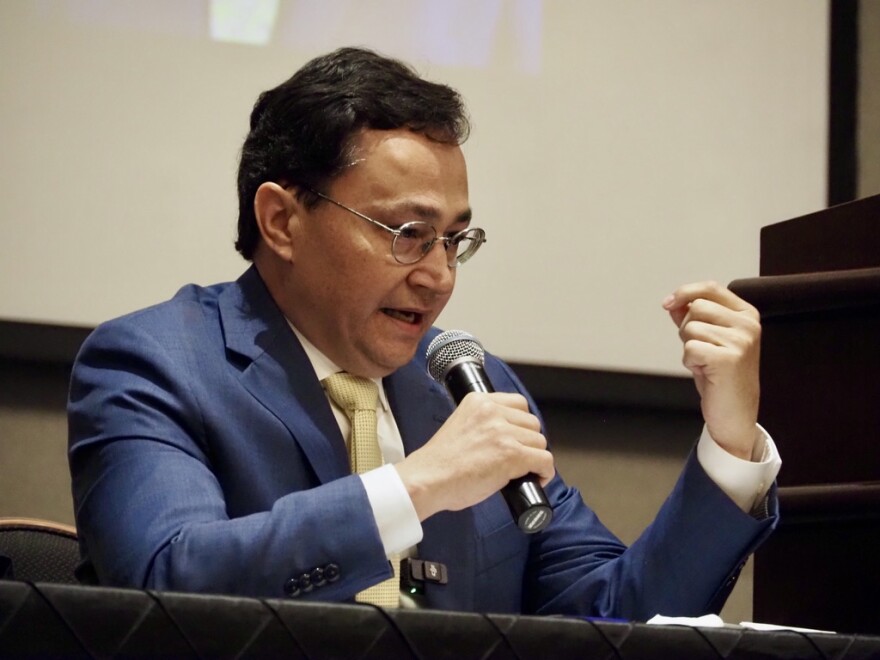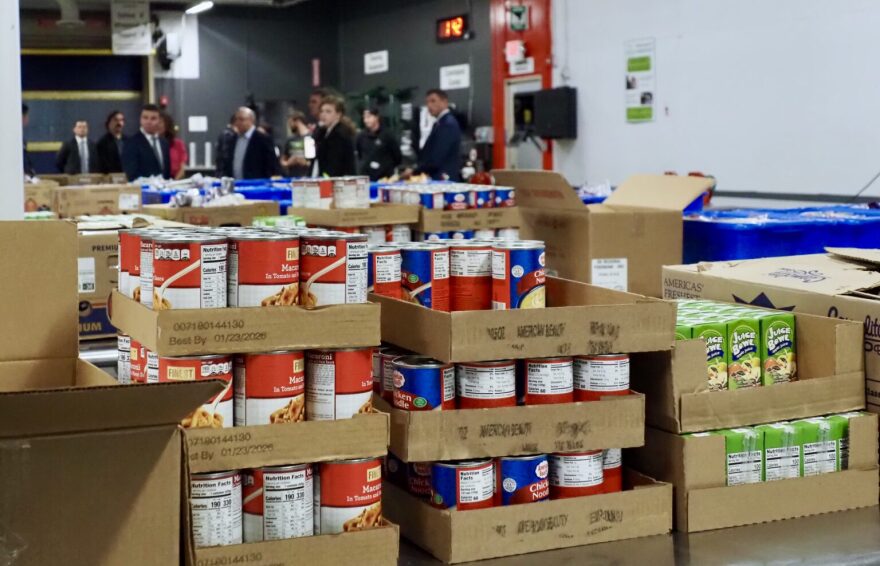Some Oklahoma leaders are asking the governor to call a special session to provide emergency state funding for food assistance programs during the federal government shutdown.
Over 680,000 Oklahomans could be cut off from the federal Supplemental Nutrition Assistance Program, also known as food stamps, on Saturday if the shutdown continues. Gov. Kevin Stitt on Wednesday called on Oklahomans, nonprofits, food banks and religious groups to step up to help fill the gap, but he said the state will not use its savings to replace the program’s funding yet.
Tribal leaders, members of the legislative Black caucus and House and Senate Democrats, meanwhile, are calling for Republicans to take greater action, including holding a special session to tap into the state’s savings to fund the program and feed Oklahomans.

A special session can be called by the governor or by the Legislature, if two-thirds of both the House and Senate sign on.
“We have an obligation to protect children,” said Senate Minority Leader Julia Kirt, D-Oklahoma City, in a statement. “The solutions offered by the governor (Wednesday) are inadequate. He needs to call the Legislature into a special session to work on real and immediate solutions.”
Gov. Kevin Stitt, House Speaker Kyle Hilbert, R-Bristow, and President Pro Tem Lonnie Paxton, R-Tuttle, did not comment Thursday on the calls for a special session to tap into the state’s savings.
The federal government has been shut down since Oct. 1 because Congress has failed to find a bipartisan path forward on a stopgap spending bill by the start of the federal fiscal year. A Republican proposal seeks to temporarily keep the government open through Nov. 21. Democrats back a separate plan to permanently restore health subsidies for those who buy health insurance through the Affordable Care Act marketplace.
Rep. Mark Lawson, R-Sapulpa, said in a statement Thursday that lawmakers know Oklahomans are being impacted “through no fault of their own,” but Congress needs to “do their job and vote to reopen the federal government.”
“We cannot sustain funding SNAP benefits – which cost over $100 million a month in Oklahoma – for long with only state dollars, leaving Oklahomans in no better position than they are facing with the Nov. 1 deadline,” Lawson said. “Not to mention funding for our troops, air traffic controllers and other safety programs. Many of our own state employees are facing furloughs. Their salaries depend on federal dollars.”
Cherokee Nation Principal Chief Chuck Hoskins Jr. called on Stitt to use the state’s surplus funding in the rainy day fund to replace the SNAP benefits that could be cut off come Nov 1.

The “rainy day fund,” otherwise known as the constitutional reserve fund, was created to collect surplus revenue to spend in select circumstances. The fund is capped at 15% of the current estimate for the state’s general revenue fund, according to the Oklahoma Policy Institute, an independent, nonpartisan Tulsa-based think tank.
The fund’s current balance sits at more than $1.32 billion, according to the House budget portal.
Hoskins said now is the time to use the fund to help Oklahomans to “stem misery that (Stitt) did not cause.”
“This crisis, a product of failures in Washington, D.C., can be fixed at least in the short term, if we all pitch in,” Hoskins said in a statement. “The state of Oklahoma should join us by immediately committing $142 million to save SNAP for Oklahomans through the end of November.”
The Cherokee Nation has committed some of its surplus funding to help provide relief to “thousands of Cherokees in Oklahoma” who could lose SNAP benefits, Hoskins said in a statement. The tribal nation is also providing $1.25 million to food banks and nonprofits to “help all of our friends and neighbors,” according to a statement.
State law, though, limits how much of the rainy day funds can be spent.
No more than three-eighths of the fund can be used in the case of a revenue shortfall in the current budget year or to use in the next budget year when there’s a predicted shortfall, according to the Oklahoma Policy Institute. Three-eighths of the current fund equates to around $495 million.

A quarter of the fund, which would be about $330 million, can be spent using the appropriations process in the case of an emergency and $10 million can be spent on “tax incentives for at-risk manufacturers.”
An emergency must be declared by the governor with two-thirds of the House and Senate agreeing to appropriate the funding, or by a “joint declaration of emergency conditions” by the House Speaker and President Pro Tem of the Senate with approval from three-quarters of each legislative chamber.
Five members of the Oklahoma Legislative Black Caucus, all Democrats, on Wednesday signed a letter to Stitt, Paxton and Hilbert asking for a special session to address SNAP benefits and the “devastating impact” a lapse in benefits could have. The members said ensuring food access is nonpartisan and a “moral responsibility” and urged swift action, according to a news release.
“The welfare of Oklahoma’s citizens must remain the top priority of elected leaders at every level of government,” according to the letter. “If Governor Stitt fails to act, we call on legislative leadership to gather the signatures necessary to convene a special session to provide temporary state funding for SNAP recipients until the federal shutdown is resolved.”
Oklahoma Voice is part of States Newsroom, a nonprofit news network supported by grants and a coalition of donors as a 501c(3) public charity. Oklahoma Voice maintains editorial independence.








